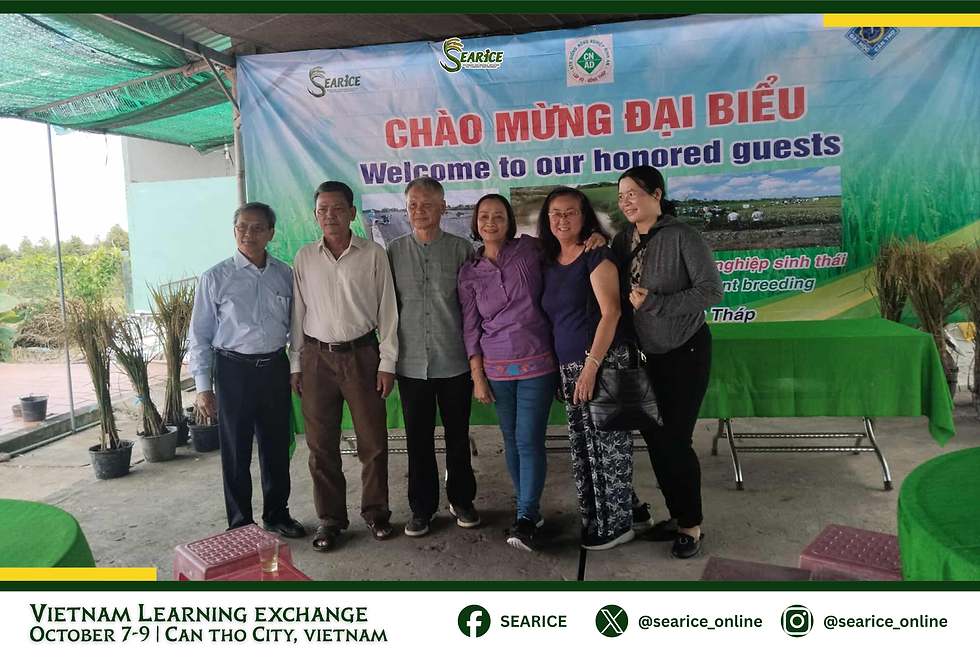Rethinking Rice Systems: What Vietnam’s Farmers Are Teaching its Neighboring Countries
- Nov 7, 2025
- 5 min read
Lessons from a 3-day learning exchange on agroecology, seed autonomy, and farmer-led innovation in the Mekong Delta

Designing sustainable agricultural systems begins in fields where farmers experiment, adapt, and survive. Their evolving and even traditional practices are a crucial aspect of restoring soils, reclaiming seeds, and reshaping food systems, which neighboring practices can learn from.
These are the core insights highlighted on the Learning Exchange Program organized by SEARICE, together with Can Tho University-Mekong Delta Research Institute and various partners in the Mekong Delta, Vietnam, from October 7-9, 2025. Over the course of the three-day, jam-packed event, various farmers and NGO representatives across Indonesia, Thailand, and the Philippines visited various farming initiatives championing agroecology, sustainable seed production, and organic farming practices.
The learning exchange from Vietnam has a total of 16 participants from Indonesia, Thailand, and the Philippines. The following organizations also took part in the event:
Indonesia: Field Foundation, Lestari Tiga Farmer Group, Exxon Mobil, Field Foundation
Thailand: Hug Muang Nan Foundation, Alternative Agriculture Network
Philippines: OFWABACA Farmers Association (Kabankalan, Negros Occidental); Samahan ng mga Makakalikasang Magsasaka ng Kabacan; Municipal Agriculture Office Mlang, North Cotabato; Mailum Organic Village Association, Bago City, Negros Occidental; Earth Care Foundation
Seed Production through a Rice-Fish System

At the Dinh An Seed Club, farmer-breeder Nguyen Anh Dung reflected on the changes he has seen in his farm despite still being in a transitional period after shifting to agroecological practices two years ago. During day one of the learning exchange, Mr. Dung proudly showed the team the diversified farming system, where rice is grown together with fish in the same field. While the fish controls pests, it can also provide the farmer with extra income and save on pesticide costs.

Mr. Dung has now extensively expanded their breeding program. From breeding eight varieties of rice, his farm now has 87 varieties in total through the Farmer Field Schools on Participatory Plant Breeding (PBB) and Plant Varietal Selection (PVS), a SEARICE capacity-building initiative.

According to Mr. Dung, the ST25 variety has the greatest potential, with yields reaching 75 bags per hectare. It is equivalent to almost 4 tons of harvest before milling, enough rice to feed more than 70 families for a month.
Indonesian participants, on the other hand, shared the practice of utilizing carbonized rice hulls for soil conditioning. When mixed into the field, it helps make the soil healthier, prevents erosion, and allows it to hold water longer.
Merging Traditional and Modern Seed Production Techniques

The visit to the Farmer’s Seed Enterprise in Tan Thoi hamlet, Tan Huong commune, Dong Thap Province, focused on three main areas: understanding how seeds are produced and processed, learning best practices in organic seed management, and strengthening ASEAN collaboration for sustainable seed enterprise development.
During the second day of the learning exchange, Dr. Tin highlighted the long-standing partnership between Can Tho University and SEARICE. From their collaboration in the Community Biodiversity Development and Conservation (CBDC) project in 1996, they have since expanded to work on Participatory Plant Breeding (PPB), Participatory Varietal Selection (PVS), and seed conservation to strengthen the informal seed system in the Mekong Delta, Vietnam.

The impact of this collaboration is visible in the fields, where family collaboration is at the core of this farmer-run seed enterprise. Ngo Van Thuyen, Chairman of the Seed Enterprise, runs a seed system together with his wife, who handles marketing and distribution, and their son, who works directly in the fields, making it a truly family-driven system from production to market.
The team saw firsthand how the family runs their own seed enterprise and how they merge traditional knowledge and modern technology, alongside institutional support, to produce and supply high-quality seeds at scale.
Mr. Ngo Van Thuyen showed 80 different rice lines and varieties that are being tested and produced for seeds, wherein farmers who are part of the enterprise help manage every stage of the process, from preparing the seeds to harvesting them.
The farm follows the System of Rice Intensification (SRI), where rice is planted with wider spacing to let the plants grow stronger roots. It is an agroecological approach that reduces seed, water, and chemical use while increasing productivity through improved plant spacing and soil health.
MODERN MEETS TRADITIONAL. High-tech fieldwork in the air, legacy drying methods on the ground
Meanwhile, a live demonstration showed how a drone can spread fertilizer across 8,000 square meters in just 15 minutes. The same drone is used for direct seeding, which is less labor-intensive than before. The institutional support is seen as beneficial, as the government subsidizes 70% of the cost for the drone rental.
After the field visit, the group was welcomed into Mr. Thuyen’s home to see the warehouse and rice processing area, including a 20-year-old charcoal-powered rice dryer that is still used to dry freshly harvested palay seeds. The enterprise’s seed production and processing systems that merge traditional and modern techniques were found to be efficient and well-managed, producing high-quality seeds with strong germination and yield potential.
Organic Farming as a Sustainable Enterprise

On the third day, the participants of the learning exchange also witnessed how strong marketing strategies, coupled with government support, can enable cooperatives to grow and expand. At the Tan Dat Cooperative farm, 100 hectares of export-quality organic rice are cultivated for the European and Canadian markets.

Alongside large-scale rice production, the cooperative also creates value-added products such as rice oil, cakes, lotion, syrups, and skincare items.
For Mr. Tan Dat, running an organic cooperative means thinking beyond short-term profit, as it requires long-term commitment, climate adaptation, and careful water management. He shared how the cooperative relies on organic inputs, improves soil fertility without chemicals, and maintains the quality of irrigation water using water hyacinth. This plant naturally absorbs contaminants before water enters the fields.
What We Can All Learn From the Learning Exchange
As more farmers become aware of how climate change can impact agriculture, sustainable agricultural practice is also a mindset that values experimentation, local knowledge, and long-term thinking. The Learning Exchange in Vietnam’s Mekong Delta demonstrated how farmers are leading the way in sustainable rice production.
The lack of government support in agriculture among various Southeast Asian countries remains evident. Indonesia, Thailand, and the Philippines can learn from the Vietnamese practice that agroecology is rooted in collaboration and strong social values. Upon observing the practices from the learning exchange, policymakers shall rethink the systems that consider the needs of the future.
Empowered farmers are the backbone of creating sustainable Southeast Asian agriculture. They cultivate not only crops, but climate-resilient and sustainable food systems that can nourish generations to come.



































